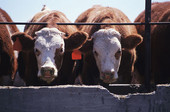- The Best Time of Day to Drink Bone Broth to Maximize Health Benefits
- 8 Ways to Increase Dopamine Naturally
- 7 Best Breads for Maintaining Stable Blood Sugar
- Gelatin vs. Collagen: Which is Best for Skin, Nails, and Joints?
- The Long-Term Effects of Daily Turmeric Supplements on Liver Health
- Could Your Grocery Store Meat Be Causing Recurring UTIs?
- Are You Making This Expensive Thermostat Error This Winter?
- Recognizing the Signs of Hypothyroidism
- 10 Strategies to Overcome Insomnia
- Could Artificial Sweeteners Be Aging the Brain Faster?
Could Cow Fertilizer Help Spread Antibiotic Resistance?


Manure from dairy cows contains a surprisingly high number of antibiotic resistance genes from the animals’ gut bacteria, a new study shows.
This is important because manure from cows is widely used as a farm soil fertilizer, and antibiotic resistance genes could be transferred to bacteria in soil used to grow food. The genes potentially could then move from bacteria on the food to people, the researchers explained.
For the study, the investigators analyzed manure samples from dairy cows and identified 80 unique antibiotic resistance genes that made a laboratory strain of E. coli resistant to four types of antibiotics.
About three-quarters of these 80 genes were only distantly related to previously identified antibiotic resistance genes. The researchers also discovered an entire new family of antibiotic resistance genes that thwart chloramphenicol antibiotics used to treat respiratory infections in livestock.
The study was published April 22 in the online journal mBio.
“The diversity of genes we found is remarkable in itself considering the small set of five manure samples,” senior author Jo Handelsman, a Yale University microbiologist and a Howard Hughes Medical Institute professor, said in a news release from the American Society for Microbiology.
“But also, these are evolutionarily distant from the genes we already have in the genetic databases, which largely represent [antibiotic resistance genes] we see in the clinic,” she added.
The researchers said their findings show that cow manure contains “an unprecedented reservoir of [antibiotic resistance] genes” that could move into people.
“This is just the first in a sequence of studies — starting in the barn, moving to the soil and food on the table, and then ending up in the clinic — to find out whether these genes have the potential to move in that direction,” Handelsman said.
More information
The U.S. Centers for Disease Control and Prevention has more about antibiotic resistance.
Source: HealthDay
Copyright © 2026 HealthDay. All rights reserved.










